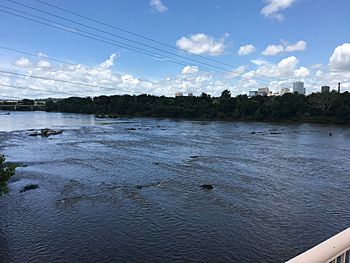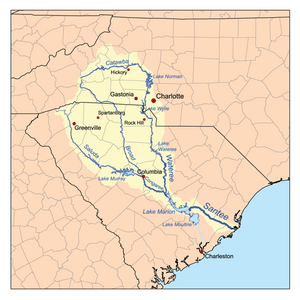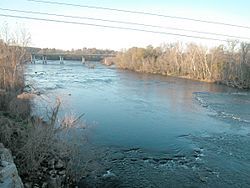Congaree River facts for kids
Quick facts for kids Congaree River |
|
|---|---|

Congaree River with the Columbia skyline in the background
|
|

Map of the Santee River watershed showing the Congaree River
|
|
| Country | United States |
| State | South Carolina |
| Physical characteristics | |
| Main source | confluence of Saluda River and Broad River Columbia 33°59′41″N 81°03′01″W / 33.994758°N 81.050268°W |
| River mouth | Lake Marion 33°41′39″N 80°35′48″W / 33.694120°N 80.596574°W |
| Length | 53 mi (85 km) |
| Basin features | |
| Progression | Congaree → Santee → Atlantic Ocean |
| River system | Saluda River |
| Landmarks | Congaree National Park |
The Congaree River is a wide but short river in South Carolina, United States. It flows for about 53 miles (85 km). This river is very important because it collects water from the Lower Saluda and Lower Broad areas. It then joins the Wateree River to form the larger Santee River, just north of Lake Marion.
The Congaree River starts in Columbia. It forms where the Saluda and Broad rivers meet. This meeting point is near the Piedmont Fall Line. The river also creates a natural border between Richland, Calhoun, and Lexington counties. The main cities close to the river are Columbia on the east side, and Cayce and West Columbia on the west side.
Even though there's a huge swampy area below Columbia, the Congaree River is navigable for much of its length. This means boats and barges can travel on it, especially when the water is high. Barges can travel upriver from the Port of Charleston. This journey is about 100 miles (167 km) long, going through the Santee-Cooper Lakes. They can reach within 5 miles (8 km) of the fall line.
The Congaree National Park is one of the best places to visit along the river. It's located about halfway along the river's path. This park is huge, covering about 22,200 acres (90 km²). It protects some of the last remaining old growth bottomland hardwood forest in North America. There are many fun activities you can do there. These include hiking, biking, bird watching, and canoeing. You can also learn about different plants, which is called botanical interest.
The river got its name from the Congaree Indians. They were a Native American tribe who used to live along the river's banks a long time ago.
River Crossings
Here is a list of bridges and other crossings over the Congaree River. They are listed from where the river begins in Columbia, going downstream to where it meets the Wateree River.
- Columbia/West Columbia/Cayce
- Jarvis Klapman Blvd (SC 12)
- Gervais Street Bridge (U.S. 1/U.S. 378)
- Blossom Street Bridge (U.S. 21/U.S. 321)
- Granby/Olympia Mills railroad trestles
- Interstate 77/Southeastern Beltway, Gills Creek forms near the I-77 Bridge
- Eastover
- railroad trestle near confluence
- McCords Ferry Road (U.S. 601), connecting Eastover and Saint Matthews
See also
 In Spanish: Río Congaree para niños
In Spanish: Río Congaree para niños
 | Misty Copeland |
 | Raven Wilkinson |
 | Debra Austin |
 | Aesha Ash |


